新概念英语第一册Lesson-29-30精品课件
- 格式:ppt
- 大小:13.43 MB
- 文档页数:56
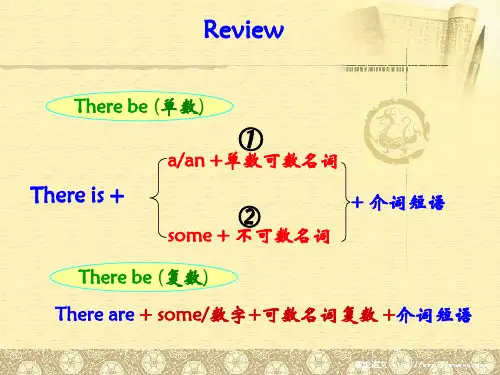
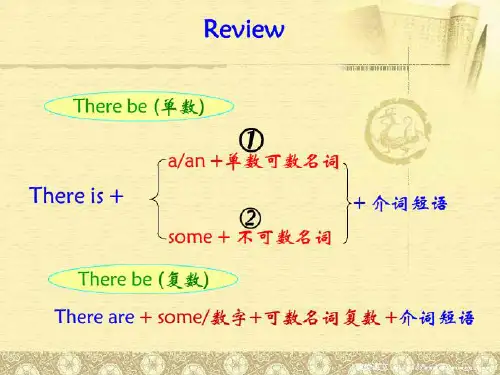
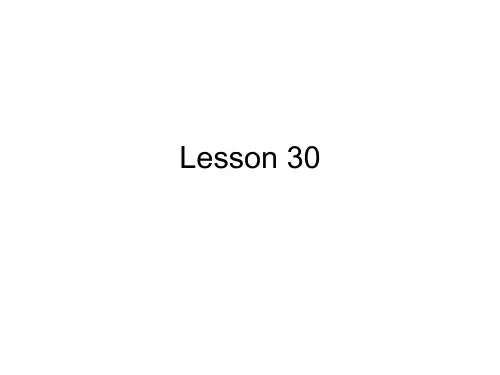

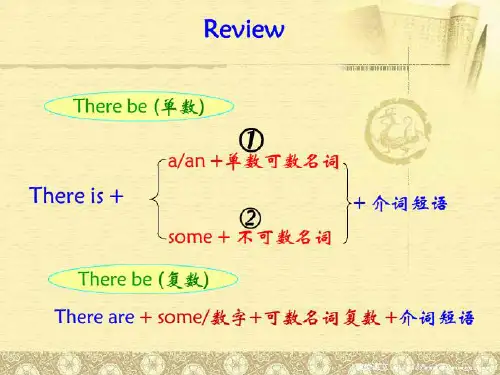
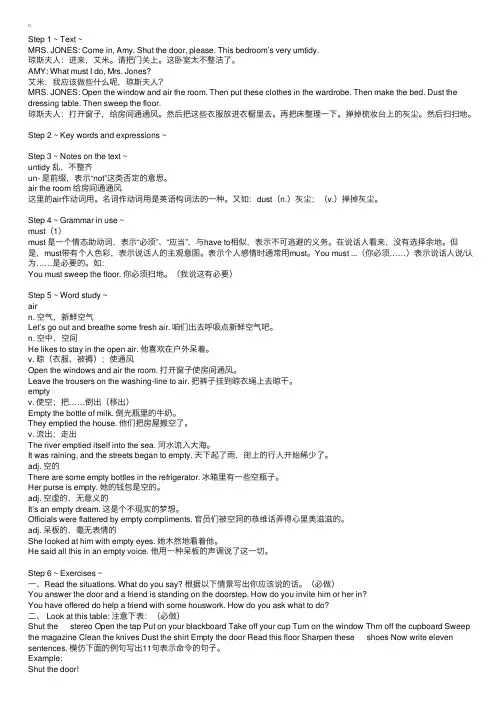
Step 1 ~ Text ~MRS. JONES: Come in, Amy. Shut the door, please. This bedroom’s very umtidy.琼斯夫⼈:进来,艾⽶。
请把门关上。
这卧室太不整洁了。
AMY: What must I do, Mrs. Jones?艾⽶:我应该做些什么呢,琼斯夫⼈?MRS. JONES: Open the window and air the room. Then put these clothes in the wardrobe. Then make the bed. Dust the dressing table. Then sweep the floor.琼斯夫⼈:打开窗⼦,给房间通通风。
然后把这些⾐服放进⾐橱⾥去。
再把床整理⼀下。
掸掉梳妆台上的灰尘。
然后扫扫地。
Step 2 ~ Key words and expressions ~Step 3 ~ Notes on the text ~untidy 乱,不整齐un- 是前缀,表⽰“not”这类否定的意思。
air the room 给房间通通风这⾥的air作动词⽤。
名词作动词⽤是英语构词法的⼀种。
⼜如:dust(n.)灰尘;(v.)掸掉灰尘。
Step 4 ~ Grammar in use ~must(1)must 是⼀个情态助动词,表⽰“必须”、“应当”,与have to相似,表⽰不可逃避的义务。
在说话⼈看来,没有选择余地。
但是,must带有个⼈⾊彩,表⽰说话⼈的主观意图。
表⽰个⼈感情时通常⽤must。
You must ...(你必须……)表⽰说话⼈说/认为……是必要的。
如:You must sweep the floor. 你必须扫地。
(我说这有必要)Step 5 ~ Word study ~airn. 空⽓,新鲜空⽓Let’s go out and breathe some fresh air. 咱们出去呼吸点新鲜空⽓吧。
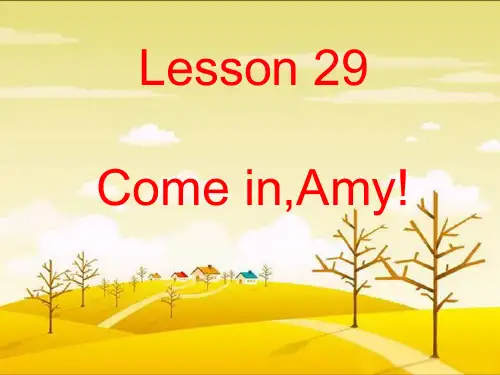
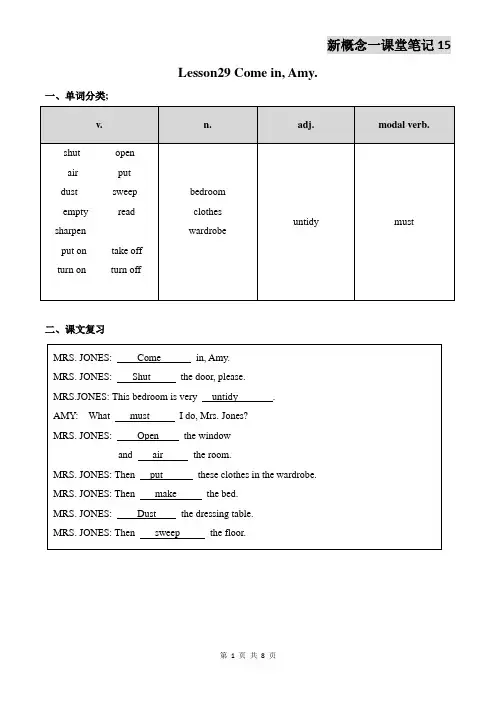
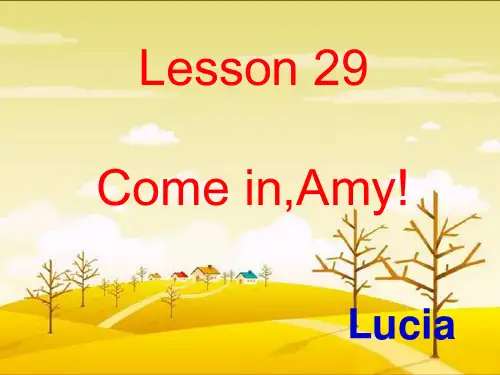
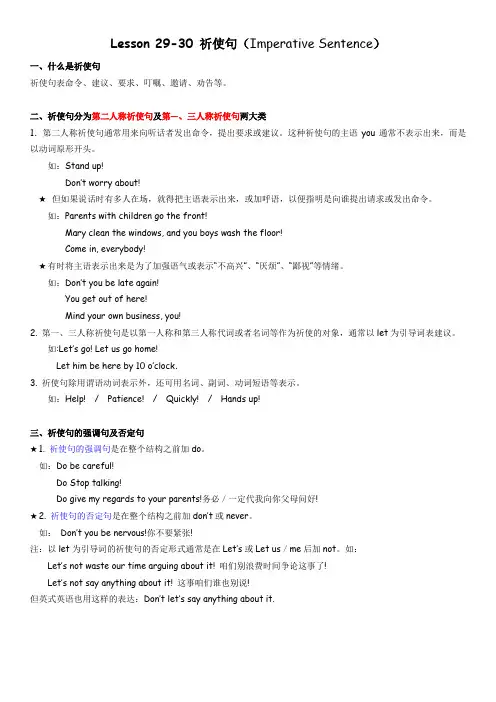
Lesson 29-30 祈使句(Imperative Sentence)一、什么是祈使句祈使句表命令、建议、要求、叮嘱、邀请、劝告等。
二、祈使句分为第二人称祈使句及第—、三人称祈使句两大类1.第二人称祈使句通常用来向听话者发出命令,提出要求或建议。
这种祈使句的主语you通常不表示出来,而是以动词原形开头。
如:Stand up!Don’t worry about!★但如果说话时有多人在场,就得把主语表示出来,或加呼语,以便指明是向谁提出请求或发出命令。
如:Parents with children go the front!Mary clean the windows, and you boys wash the floor!Come in, everybody!★有时将主语表示出来是为了加强语气或表示“不高兴”、“厌烦”、“鄙视”等情绪。
如:Don’t you be late again!You get out of here!Mind your own business, you!2. 第一、三人称祈使句是以第一人称和第三人称代词或者名词等作为祈使的对象,通常以let为引导词表建议。
如:Let’s go! Let us go home!Let him be here by 10 o’clock.3. 祈使句除用谓语动词表示外,还可用名词、副词、动词短语等表示。
如:Help! / Patience! / Quickly! / Hands up!三、祈使句的强调句及否定句★1. 祈使句的强调句是在整个结构之前加do。
如:Do be careful!Do Stop talking!Do give my regards to your parents!务必/一定代我向你父母问好!★2. 祈使句的否定句是在整个结构之前加don’t或never。
如:Don’t you be nervous!你不要紧张!注:以let为引导词的祈使句的否定形式通常是在Let’s或Let us/me后加not。
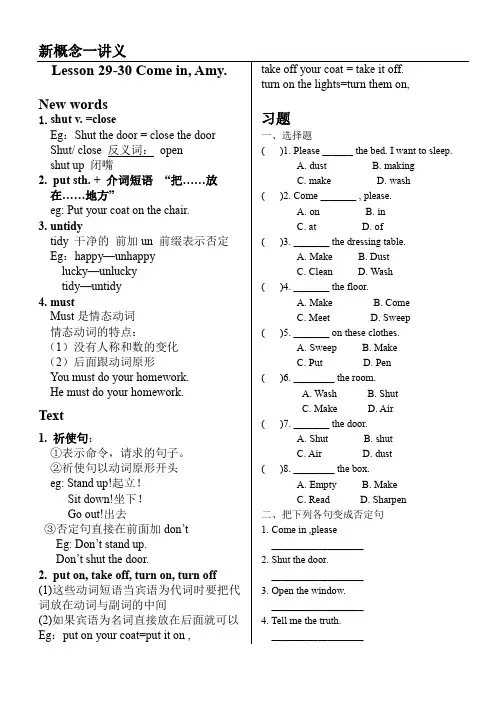
新概念一讲义Lesson 29-30 Come in, Amy. New words1.shut v. =closeEg:Shut the door = close the door Shut/ close 反义词:openshut up 闭嘴2. put sth. + 介词短语“把……放在……地方”eg: Put your coat on the chair.3. untidytidy 干净的前加un 前缀表示否定Eg:happy—unhappylucky—unluckytidy—untidy4. mustMust是情态动词情态动词的特点:(1)没有人称和数的变化(2)后面跟动词原形You must do your homework.He must do your homework.Text1. 祈使句:①表示命令,请求的句子。
②祈使句以动词原形开头eg: Stand up!起立!Sit down!坐下!Go out!出去③否定句直接在前面加don’tEg: Don’t stand up.Don’t shut the door.2. put on, take off, turn on, turn off (1)这些动词短语当宾语为代词时要把代词放在动词与副词的中间(2)如果宾语为名词直接放在后面就可以Eg:put on your coat=put it on , take off your coat = take it off.turn on the lights=turn them on,习题一、选择题( )1. Please ______ the bed. I want to sleep.A. dustB. makingC. makeD. wash( )2. Come _______ , please.A. onB. inC. atD. of( )3. _______ the dressing table.A. MakeB. DustC. CleanD. Wash( )4. _______ the floor.A. MakeB. ComeC. MeetD. Sweep( )5. _______ on these clothes.A. SweepB. MakeC. PutD. Pen( )6. ________ the room.A. WashB. ShutC. MakeD. Air( )7. _______ the door.A. ShutB. shutC. AirD. dust( )8. ________ the box.A. EmptyB. MakeC. ReadD. Sharpen二、把下列各句变成否定句1. Come in ,please__________________2. Shut the door.__________________3. Open the window.__________________4. Tell me the truth.__________________。
2016新概念第一册L e s s o n29-30课堂及课后练习(总3页)--本页仅作为文档封面,使用时请直接删除即可----内页可以根据需求调整合适字体及大小--新概念一Lesson29课内语法新课内容三、单词:拼读,过关,讲解1、shut v 关门. 反义词:open(v) eg:Shut the door please .请关门。
close v 关反义词:open(v) closed adj 反义词:open(adj)2、bedroom n 卧室 in the bedroom 在卧室里 living room客厅 sitting room客厅;起居balcony阳台 bathroom 浴室 kitchen厨房 dining room饭厅 washroom洗手间3、untidy adj 乱;不整齐。
反义词:tidy adj 整齐的 eg:This bedroom is very untidy. 这卧室太不整洁了。
在英语中有些单词在前或后加上一个词缀就变成了相反的意思。
eg:comfortable 舒服的---uncomfortable 不舒服的 usual平常的---unusual不寻常的4、must情态动词,后接动词原形。
意为:必须,应该。
与have to相似,表示不可逃避的义务。
在说话人看来,没有选择的余地。
但是,must带有个人色彩,表示说话人的主观意图。
eg:What must I do 我应该做些什么呢 You must sweep the floor.你必须扫地。
5、open v 打开。
(反义词:shut,close) eg:Open the window. 打开窗子。
6、air v 使……通风,换换空气。
n 空气(不可数) eg:Air the room.给房间通通风。
7、put v 放置 put on 穿上,用法:名词中间, 后面均可,代词只放中间。
eg:put on your coat= put your coat on put it oneg:Put these clothes in the wardrobe.把这些衣服放进衣橱里去。
新概念英语第一册Lesson29-30练习题与答案Name ____________ Score ____________一、小朋友们今天要请你们帮助爸爸妈妈打扫房间,请写出5个课上学过的打扫房间时要做的事情1. _________________________________________________2. _________________________________________________3. _________________________________________________4. _________________________________________________5. _________________________________________________二、看图片写动词词组__________________________ ____________________________________________________ __________________________三、根据提示用must写句子1. 作业没做完,妈妈对你说:_________________________________________________________________2. 爬树很危险,爸爸告诉你:_________________________________________________________________3. 你不想喝牛奶,你问妈妈:_________________________________________________________________4. 请写出第三题妈妈可能给你的两个回答:_________________________________________________________________5. 请把你写的第2题句子的主语换成Peter:_________________________________________________________________四、默写单词1._____________________2._____________________3._____________________4._____________________5._____________________新概念英语第一册Lesson29-30练习题与答案一、小朋友们今天要请你们帮助爸爸妈妈打扫房间,请写出5个课上学过的打扫房间时要做的事情(6×5=30)1. open the window2. air the room3. put the clothes in the wardrobe4. make the bed5. sweep the floor (其他课文中出现的或正确的答案也可以,如dust the dressing table)二、看图片写动词词组(4×5=20)take off/put on the hat sharpen the pencil turn on/off the television read the book三、根据提示用must写句子(7×5=35)1. 作业没做完,妈妈对你说:You must finish your homework.2. 爬树很危险,爸爸告诉你:You mustn’t climb the tree.3. 你不想喝牛奶,你问妈妈,Must I drink the milk?4. 请写出第三题妈妈可能给你的两个回答:Yes, you must. / No, you need n’t.5. 请把你写的第2题句子的主语换成Peter:Peter mustn’t climb the tree.四、默写单词(3×5=15)2._____________________2._____________________4._____________________4._____________________5._____________________。